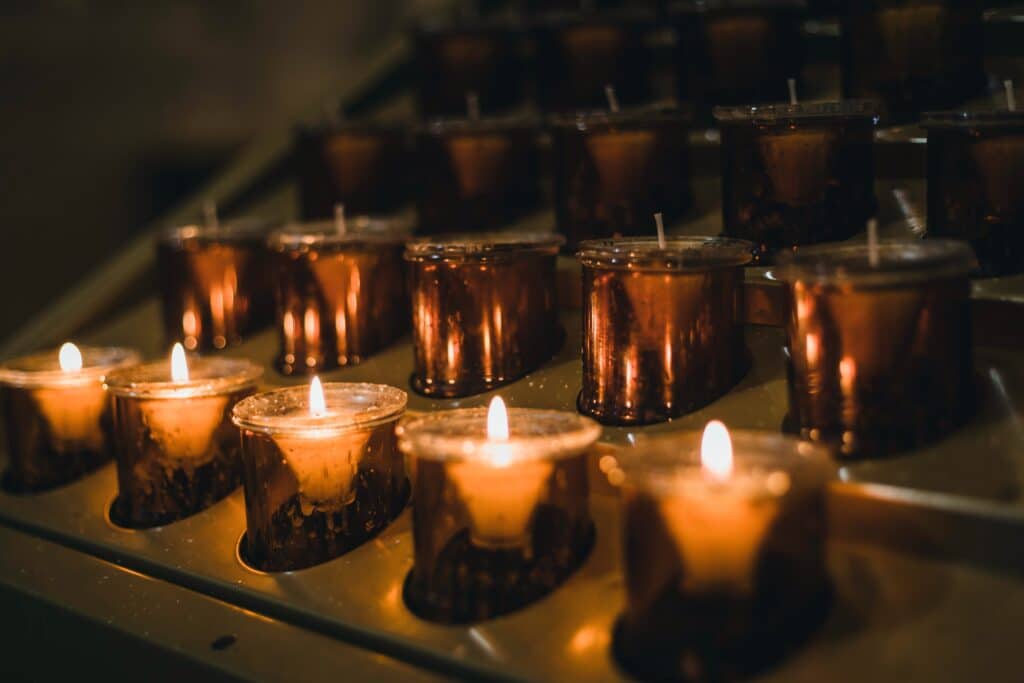These singles are awake and open to God, leading lives filled with faith, strong relationships, and community engagement.
While Vivian Sutch was growing up, she always thought she’d get married. But when she was in her mid-twenties, an engagement didn’t work out and, after that, her job as a high school Spanish teacher took priority over finding a husband.
Sutch continued to wonder about her vocation until one day, about 20 years ago, she read about how as a carpenter, Christ sanded the yokes he made for oxen so they would fit well. At that moment, she considered that the single life might be her personal yoke because it didn’t chafe her.
“From then on I’ve not looked at getting married,” says the active 71-year-old who lives in St. Paul, Minnesota. “It’s just not been anything that I’ve continued to search after. I’m very content.”
Some single Catholics have heard a call to live their entire lives as singles, but others see the life as transitional, as they discern marriage, priesthood, or religious life. Still others find that the right opportunity to enter a vocation hasn’t come after years of waiting.
Whether or not they intend to be single, singles interviewed for this article have found unique ways to love, serve, enjoy friendship and community, and meet God in the Church and in prayer. They sometimes experience loneliness and isolation, but also joy and consolation.
Following God’s Guidance
In 2016, about 110 million Americans were unmarried: 64 percent had never married, 23 percent were divorced, and 13 percent were widowed, according to US census data. More than 30 million US Catholics—or 43 percent—are unmarried, divorced, or widowed, a figure that has continued to increase since the 1960s, according to the US Conference of Catholic Bishops. Factors in the trend include delaying marriage for educational and career reasons, the individualistic culture, and higher rates of divorce.
Singles are a diverse group, and at one time or another everyone goes through a period of living as a single, says Father Ben Hasse, vocations director for the Diocese of Marquette, Michigan. “Nobody’s born into a particular state in life,” he says. “Lots of people find themselves single and come to a deep sense of peace in prayer that God’s at work in their lives, maybe even if they didn’t intend to be single.”
For most, the single life is not a permanent, lifelong state as are the vocations of marriage, religious life, and priesthood. But all singles share the basic—and most important—Christian vocation to holiness, one that is definite though not easy to live, he says.
“We really believe God’s calling in every level of our lives,” Father Hasse says. “We believe in those daily encounters with people the Lord moves, and we listen. That call will take shape in your life in a way that’s as unique as you are.”
Peter Braam, a 48-year-old who lives in Denver, doesn’t think his single life constitutes a vocation, but he agrees that God always has a purpose for each person. “It shouldn’t be seen as a denigrating reality that people happen to be single,” he explains. “The only thing that matters in life is to be a saint.”
Braam continues to discern God’s call and mission for his life. After founding a young adult ministry that flourished in the early 2000s and nearly proposing marriage to a woman, he ultimately left both for different reasons. “Day to day, moment to moment, I ask what he wants me to do,” he says.
Angela Neumann, 31, of West St. Paul, Minnesota, sought God’s will for her life during the eight years she seriously considered a religious vocation and still does as she’s discerned a call to marriage. After college, she served as a bridesmaid at many friends’ weddings, but now feels somewhat orphaned from that friend group as the only single. “You grow up and there is a life template of, ‘You go to school, and then you get married and have kids,'” she says. “There’s no template of what [to] do when that doesn’t happen.”
Neumann feels a tension between remaining open to God’s will and trusting that if he wants her to meet a future spouse, she will. And at times, she has a temptation to question, What’s wrong with me that I’m still single? She thinks singles could use more formation on how to approach dating and life. “More and more people are either not getting married or they’re getting married later in life,” she says, “so some formation about how do I live out holiness in this state is really necessary.”
As he seeks to grow in holiness and prepares to be a good spouse, Tom Ryan, 41, of Stillwater, Minnesota, is trying to break bad habits he hasn’t had to work on while living alone. Ryan also is learning about spiritual fatherhood by prayerfully “adopting” unborn babies who may be in danger of abortion.
“I believe if I’m to enter the marriage vocation, it will unfold in God’s time when I can get my pieces together, my act together,” Ryan says. “God’s not going to give us things we’re not prepared for. I do believe I’m not where I’m supposed to be. I’m getting there, but I’m still on that pilgrimage to get there.”
Loving and Serving Others
Whether they feel their single life is transitional or permanent, being single shouldn’t be a label, Sutch says. “We’ve become too compartmentalized with so many things. Whatever company you’re in, you’re not looking at their marital status.”
Mary Pavek, a slender woman of 60 who lives in Boise, Idaho, desires to be married, and if that happens, she says she will continue to find peace, hope, and love in the Lord’s call each day as she has in her life as a single. “I’m not going to identify as a single person or a married person,” she says. “I am to love where the Lord has me, to love the people that come into my life every day in a daily pattern.”
In a 1997 address, Pope John Paul II recognized singles who had been unable to marry or enter a priestly or religious vocation. “If their celibacy was not chosen, this can make them feel that their life is partly a failure,” he said. “May they not lose heart, for Christ never abandons those who trust in him! They can dedicate themselves to others and to developing fulfilling fraternal relations. They are examples for many. They have their full place in the ecclesial community. In every state, a life of giving is a source of joy.”

Singles such as Pavek have freedom to give of themselves and accept opportunities that other Catholics can’t because they’re not single. Three years ago, Pavek moved back to Idaho from Minnesota to care for her parents who suffer from Alzheimer’s disease. Her siblings live closer but have their own families and couldn’t oversee their parents’ care as Pavek could by moving in with them. The move also has given Pavek, who suffers from Lyme disease, flexibility to rest when necessary because she’s not working at a full-time job. More recently, she’s managed her parents’ transition to a care center.
“Now I think my role is more hidden, serving my parents and my family,” she says.
Along with finding special ways to serve, singles sometimes can take advantage of other opportunities. Neumann is considering studying for a doctorate in Austria next year, something she thinks would be difficult if she were married with a family. “I’m radically available, so how do I use that for good versus the negatives of just thinking, I’m still not married, still don’t have a family?” she asks herself.
In 2005, Sutch offered her availability to assist with administrative work at a Catholic community in Costa Rica during a senior gap year. “It opened up new avenues of skills that I didn’t realize that I had, and it actually sharpened a lot of the skills and developed new skills in translating,” she says.
Finding Community
Singles have freedom, but they do well when they’re able to find communities of friendship and leave the poverty of isolation, Braam says. He relied on his community of friends when he was diagnosed with Hodgkin’s lymphoma in 2008 and felt that God had taken him into the desert.
“I think we always look for some sense of being on the right path or on the rails,” he says. “Cancer derailed everything that I thought I was supposed to do. I really had to accept this was the new reality that God had for me, fighting a deadly illness. And also, I had to accept that my life might end.”
During his four years of desolation with the disease, Braam’s friends and family responded in many ways, including gathering regularly to pray for him, helping with therapy, organizing fund-raising to pay his medical bills, and making meals. Now in full remission from the cancer, Braam continues to find fellowship and support for his faith in the Neocatechumenal Way, a charism within the Church dedicated to formation in Christian life based principally on catechesis and liturgy, which is lived in communities of believers.
As a single woman living far from her biological family, Sutch says she finds a sense of family and community in different circles of friends: the Catholics she meets for coffee after daily Mass, the Catholic covenant community she’s belonged to for 34 years, and her fellow retired teachers, whom she sees regularly.
Through relationships, Sutch and other singles say that God has provided assistance with her car, home advice, and other needs of life that a spouse might normally handle. “God has always provided men in my life for advice,” she says.
Singles also feel they belong in the Church, even if their needs don’t come up in the Mass intentions. “I feel that we are part of the Church and we don’t have to be married to be part of the Church,” Sutch says.
When Catholic singles gather to share interests other than their singleness, Neumann says she feels less awkward. She has found friends and community through playing softball and socializing with a network of other Catholic young adults.
Ryan has become more involved in his parish community and other faith organizations since he experienced a faith conversion at a Divine Mercy Sunday prayer service several years ago. He’s continued to grow in his faith and make Catholic friends, and has served in different ways, including organizing events and helping to lead rosaries for inmates at a nearby prison.
While involvement in his faith fills some need for fellowship, Ryan admits that occasionally he gets lonely or upset about being single. “I will see married couples, and they seem so happy and I will start to get jealous, but it quickly fades away,” he says.
Never Alone
Singles may find themselves seeking companionship, but Pavek says she knows that, during those times, God is with her. “I’m not on this journey alone,” she says. “Even though I’m alone physically, often I’m not spiritually or emotionally. I’m pretty grateful.”
The added solitude many singles have can be an opportunity to pray and seek God, Father Hasse says. “The entire rich spiritual tradition is open to every person, ” he says. “To the extent that people may have space in their life because of being single, one very hopeful, beautiful, fruitful thing they could do with some of that space would be to devote it to pursuing the spiritual life.”
Braam takes time with the Lord as he continues to discern God’s will for his life, often with a prayer written by St. Ignatius: “The deep yearning in my heart is to walk on his path and not my own.”
Singles may be waiting on the Lord for direction on their state in life, but they shouldn’t forget that God has adventures and graces for them where they are. It’s a misperception of the single life for singles to think they’ve missed out on something, Sutch says.
Singles—and especially those who didn’t plan to be single—can pursue deep friendship and intimacy with the Lord while seeking to serve and give of themselves, Father Hasse says.
Braam agrees: “The challenge of being single is not to lament singleness so much that we don’t turn ourselves outward and give ourselves to something,” he says. “It’s really important to see these years not as wasted years and ask the Lord what he is calling us to—not is he calling me, but what is he calling me to?”








